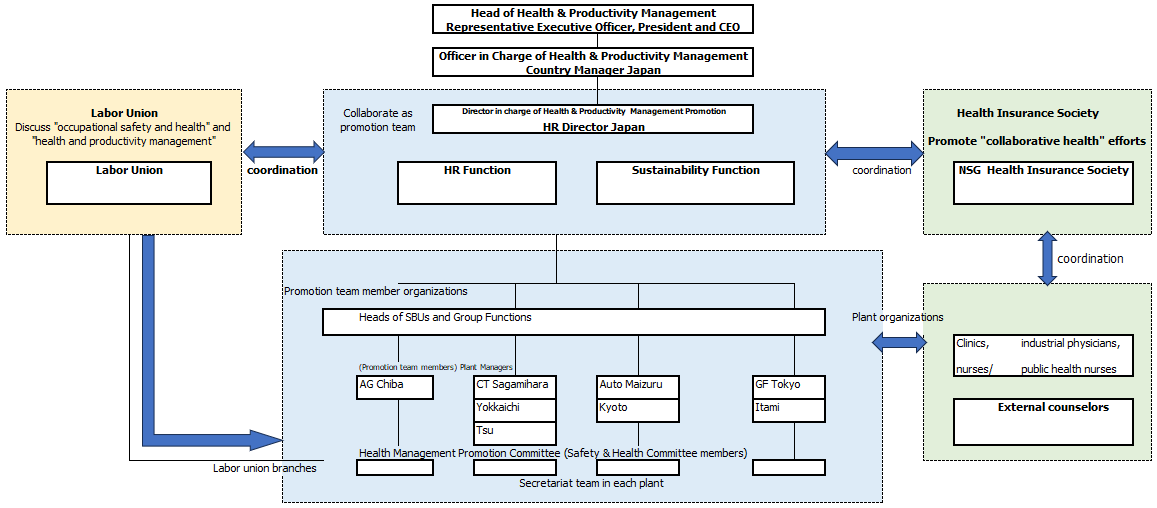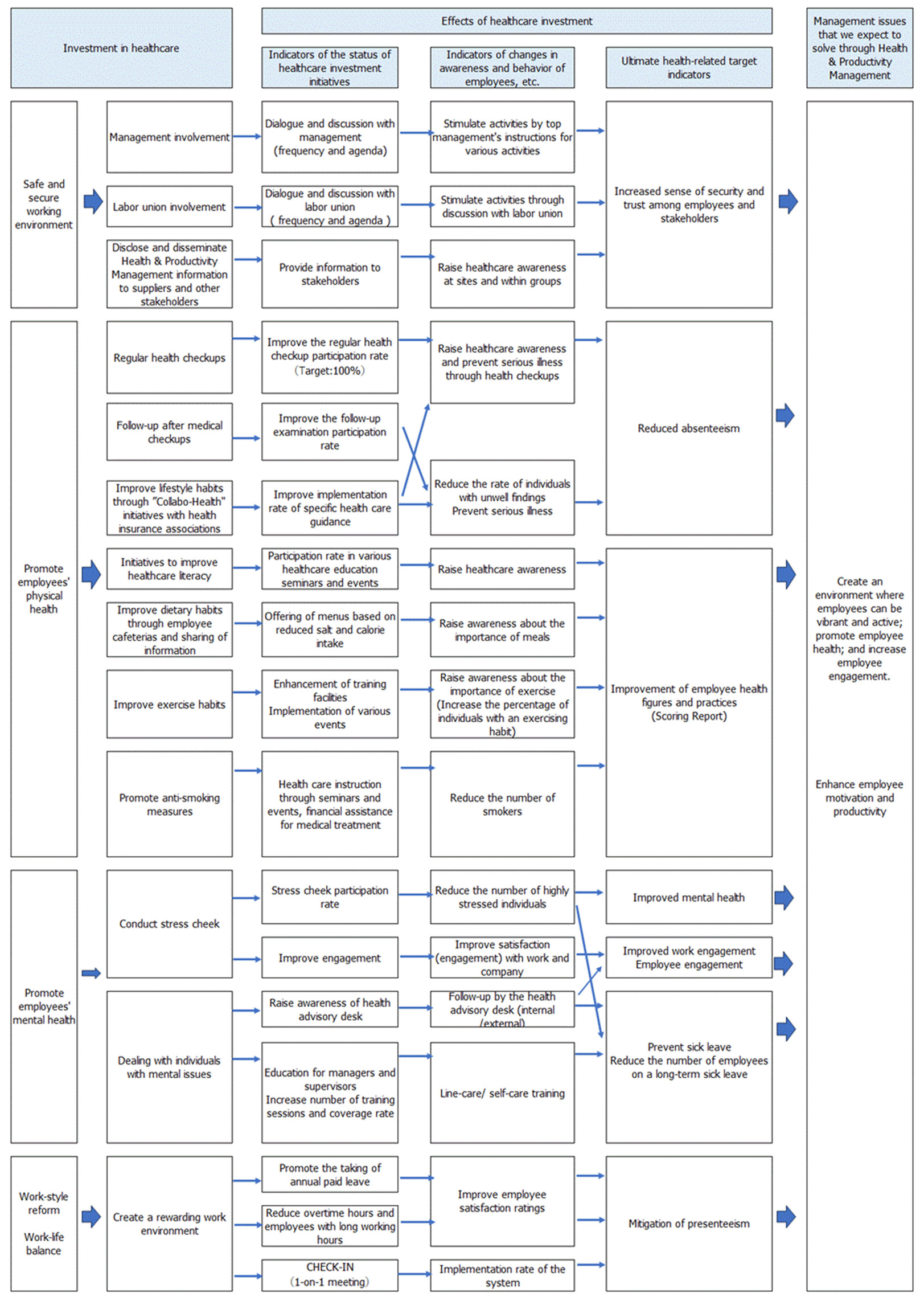Health Management and Wellbeing (Japan)
Building on our belief that "People are our most important asset", NSG Group recognizes that promoting employee health is essential to enabling individuals to perform at their best. This, in turn, drives the sustainable enhancement of the company's overall value. Reflecting this commitment, we issued a "Health Management Declaration" in Japan in January 2020.
Based on this Health Management Declaration, we are considering health management activities from a management perspective to create an environment where employees can thrive, promote employee health, increase engagement, and strategically implement and promote a variety of initiatives. Under the leadership of the President and CEO, we have put in place an organizational framework that enables the strategic implementation and promotion of various company-wide initiatives.
"Health Management Declaration"
In order to improve the sustainable value of the Group and contribute to society, we believe that the health of employees and their families is the foundation.
Since its establishment in 1918, Sumitomo's philosophy of "People are our most important asset" has been valued, and "Respect others and unleash their potential" has been set as the first core value in the current corporate principles "Our Vision".
Based on the idea, the Group is working on promoting the health of each and every employee and advancing the health management so that employees can maximize their abilities.
Structure
The promotion of health management is carried out through an organizational structure led by Representative Executive Officer, President and CEO, Munehiro Hosonuma. We implement initiatives that deepen collaboration with related organizations, such as steady efforts based on each business, collaborative health with the Nippon Sheet Glass Health Insurance Association, and discussions with the labor union from a medium-term perspective.

Main Initiatives
- Improving health literacy (health awareness) and promoting health among employees and their families
Each fiscal year, company-wide policies, initiatives, and progress related to health and productivity management are discussed at meetings attended by the CEO and the Strategic Business Unit (SBU) Heads. Additionally, efforts are made to foster a sense of unity through employee briefings at all-hands meetings held at each manufacturing site, as well as through committee activities involving employee representatives. We aim to raise health awareness by offering educational seminars on a variety of health promotion topics, while also sharing relevant health information.
- Medical Checkup
We identify and support individuals with abnormal findings through regular medical checkups conducted twice a year, along with specific health guidance. In collaboration with the health insurance association, we follow up on various medical checkups and health guidance activity, and the results of the scoring report indicate improvements in health scores. Furthermore, by leveraging health checkup data and promoting digital transformation (DX), we aim to enhance the visibility of employee health conditions and improve the accuracy of health data analysis. These activities are not limited to a single fiscal year, but rather are carried out with a medium-term perspective, in consultation with medical professionals, labor unions, and health insurance associations.
- Measures against lifestyle diseases
In the employee cafeteria, we offer menus with reduced salt and ensure alignment with a healthy calorie intake. We also improve nutritional balance, provide nutritional guidance and set up consultation desks and provide information. To encourage healthier exercise habits, we are enhancing our training facilities, partnering with external institutions, and holding a variety of events. For smoking reduction measures, we hold in-house events such as seminars, provide ongoing health guidance to employees who wish to quit smoking, and subsidize outpatient smoking cessation treatment costs. We are aiming to achieve a complete smoking ban during working hours by the end of March 2027.
- Improved mental health and employee engagement
Stress Check Program has been conducted in Japan since 2016. While the Group results are available, since employees' stress levels actually vary by organization and job role, we provide feedback to each organization in order to improve employees' stress at work. We aim to enhance employees' satisfaction and engagement with their work and the company, as these are closely linked to employee well-being - encompassing physical, mental, and social health - which in turn fosters greater enthusiasm and motivation at work. We also believe it is important to hold a variety of events to strengthen unity, foster a sense of connection within the Group, and improve workplace communication. To support this, we provide training for managers and supervisors.
- Work style reforms
We believe that empowering a diverse workforce to choose diverse working styles - such as creating an environment where employees with childcare or eldercare responsibilities can work comfortably, strengthening the management of working hours, reducing total working hours, and increasing the rate of paid leave taken - will contribute to the vitality of the company. We are advancing these initiatives through ongoing discussions between labor and management.
We have been recognized as a Certified Health and Productivity Management Organization for five consecutive years since 2021. The NSG Group is working to improve the environment to support diverse working styles. We are reviewing the way both organizations and individuals can work most effectively and aim to shift to a new work style that maximizes both productivity and performance.
Our people are our source of competitive advantage, and we will continue to have our people at the center of what we do.
* "Health Management" is a registered trademark of the NPO Kenko Kanri Kenkyukai.
The Link Between Our Management Challenges, Specific Health Management Initiatives, and the Expected Effects on Addressing the Challenges through Their Implementation
Strategy map of Health Management

The key indicators related to Health Management are as follows:
| Physical Health of Employees |
FY2023 |
FY2024 |
FY2025 |
| Regular Health Checkup Rate |
92.9% |
91.9% |
96.3% |
| Comprehensive Medical Examination Attendance Rate |
72.1% |
71.2% |
51.2% |
| Medical Institution Visit Rate |
- |
- |
45.9% |
| Specific Health Guidance Implementation Rate |
34.6% |
66.6% |
61.8% |
| Rate of Maintaining Appropriate Body Weight |
67.2% |
67.8% |
67.0% |
| Proportion of People Getting Sufficient Rest through Sleep |
66.7% |
65.1% |
62.8% |
| Alcohol Risk Ratio |
15.2% |
16.6% |
12.9% |
| Physical Activity Habits Rate |
29.5% |
30.4% |
31.8% |
| Smoking Rate |
31.7% |
31.1% |
32.0% |
| Health Awareness Seminar Participation Rate |
90.5% |
86.1% |
56.6% |
| Women's Health Seminar Participation Rate |
44.3% |
76.1% |
38.4% |
| Mental Health of Employees |
FY2023 |
FY2024 |
FY2025 |
| Stress Check Participation Rate |
88.2% |
87.5% |
89.0% |
| Number of Stress Check Targets |
2135 |
2131 |
2197 |
| High-Stress Individuals Ratio |
12.6% |
11.5% |
11.5% |
| Engagement Score (Deviation Value) |
46.5 |
46.6 |
48.5 |
| Work Engagement Score (Deviation Value) |
- |
48.0 |
48.0 |
| Employee Engagement Score (Deviation Value) |
- |
45.8 |
45.6 |
| Presenteeism (WHO-HPQ) |
- |
34.6% |
34.5% |
| Absenteeism* |
0.8% |
0.9% |
1.1% |
| Number of employees absent for long term /leave of absence per year |
16 |
18 |
24 |
*Percentage of employees who were absent or on leave due to personal injury or illness out of the total number of employees
| Work-Life Balance |
FY2023 |
FY2024 |
FY2025 |
| Annual Paid Leave Usage Rate |
76.0% |
79.7% |
83.5% |
| Average Overtime Hours per Person |
10 hours |
11 hours |
10 hours |
| Parental Leave Acquisition Rate |
Female |
100% |
100% |
100% |
| Male |
23.1% |
38.1% |
41.0% |
| Turnover Rate |
3.0% |
1.5% |
1.3% |